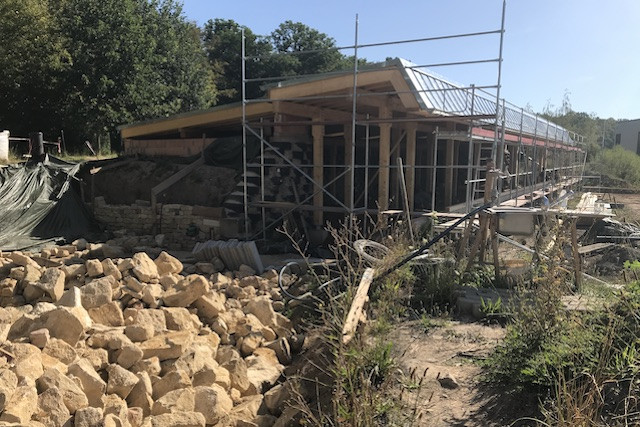International volunteers and experts built the first supporting walls of the Aërdschëff in Redange-sur-Attert using tyres pounded with earth during the summer of 2019 and it was hoped that the roof would be added by a contracted firm before the end of February.
But the call for tender and dossier for the project, which was initiated by Centre for Ecological Learning Luxembourg (Cell) with public funds, got lost. “No-one knew where it was. We lost a lot of time in between,” coordinator Annick Meiers told Delano. Then the pandemic hit in mid-March and like all construction sites, the team downed tools.
“The carpenter working on the roof was seriously sick and in hospital. So, very early on we were in quarantine,” Meiers added.
The Äerdschëff is inspired by the earthship off-grid housing movement founded by architect Mike Reynolds. Begun in the 1970s in New Mexico, earthships are passive solar houses made from natural and repurposed materials including tyres and glass bottles.

International volunteers and Earthship crew are pictured on 20 August 2019 constructing the tyre wall of the Äerdschëff. Photo: Jess Bauldry
The project runs thanks to passionate workers employed on short-term contracts, whose salaries are funded by different public funding bodies. To make matters more complex, Meier’s contract was due to end in March. The rest of the team managed to secure partial unemployment support in order to keep going. After several years in the planning, confronting constant bureaucratic and practical challenges, Meiers joked that the team was used to finding creative solutions. “It’s just another thing. I think we have been lucky and we will manage this,” she said.
Now they are making up for lost time, recruiting volunteers to help with constructing a drystone wall, a root cellar, installing the windows and insulation. “We decided not to focus on bigger group projects but to focus rather on local volunteers,” Meiers said, adding: “in general it’s harder to mobilise local volunteers […]Lots of people work a lot and if they have free time they want to do their own thing. I’m not sure if it’s not also the mentality in Luxembourg.”
Meiers and the team will be on-site every week from Monday to Friday into September. In addition to appealing for volunteers, they want to hear from anyone who has any unwanted insulation materials left over from construction sites.
People can visit the site to find out more on 22 August or 5 & 19 September, from 9:30am to 4pm.
Volunteers do not need to have specialist skills but experience with wood and timber working and physical strength are an advantage.
To find out more or volunteer, email [email protected]
